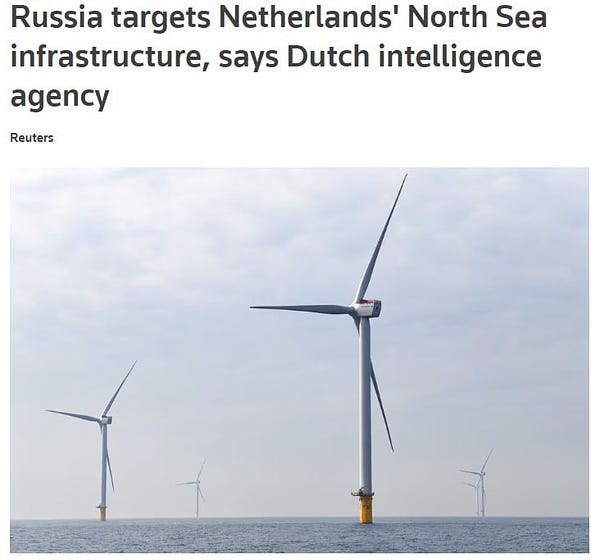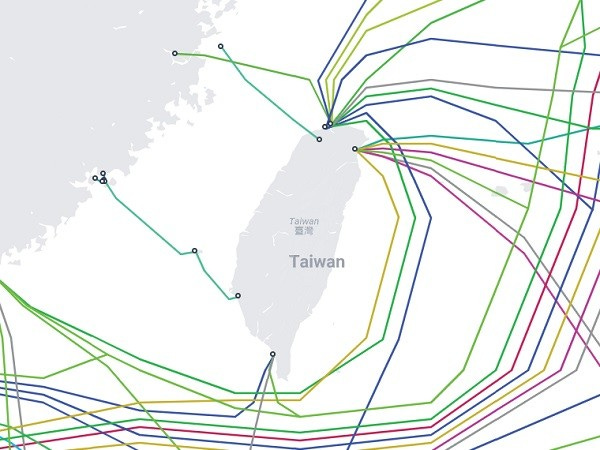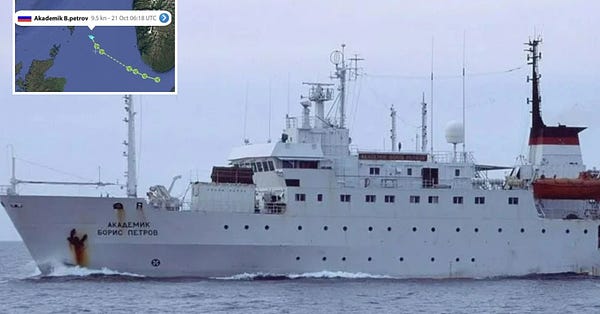We live in a world created in 1945. The United States is the world’s dominant political, economic, and military power. We treat those facts as if they are somehow immutable. They are not. We are standing on the brink of losing it all.
The Biden administration continues to blunder forward with its reckless policy of escalation in Ukraine treating the entire enterprise as if it were a video game of some sort. There are in the minds of these men and women no consequences for their actions. Only the other side takes losses. Only the other side feels pain.
That’s not how war works. That’s not how the world works.
Out there in the shadows, as tensions escalate and the world moves closer to a world war, the sharks are circling. Our enemies are already well down the road to responding to our actions and making us pay a price for our arrogance.
The world’s economy runs on internet communications. Those communications move primarily on a vast network of undersea cables. Without those cables, you do not run your business. You do not access your checking account. You do not do anything in the real world.
Without those cables, the world’s economy shuts down, and you fend for yourself.
For some time our allies in Europe have been tracking Russian vessels believed to be mapping undersea cables in the North Sea and surrounding bodies of water. The concern is that the Russians are preparing to stage attacks on these cables in retaliation for European and American support for Ukraine. Dutch military intelligence is now warning that Russian attacks could be expanded to include energy infrastructure in the region.


There have already been multiple instances of breaks in undersea cables in which the Russians are suspected. There was also recently a suspicious case of what looks very much like Russian casing in preparation for a sabotage attack on a Polish oil terminal.
On the other side of the world, Moscow’s new Chinese allies are showing the same kind of interest in the undersea cables that run to Taiwan. Two of those cables were recently cut by Chinese vessels. The Chinese appear to be billing the actions as “accidents”. There is a strong suspicion that the actions were a dry run for a much broader attack on communication with Taiwan.
On February 2, 2023, a Chinese fishing vessel sailing close to the Matsu Islands severed one of the two cables, which connect the islands with Taiwan proper. Six days later, a Chinese freighter cut the second cable. The Matsu Islands, which belong to Taiwan, are now left with rudimentary communications.


The Matsu Islands, which lie close to the coast of mainland China, have been a flashpoint for decades. In 1958 China shelled the islands. Last year the People’s Liberation Army Navy conducted large exercises near the islands.
A recently released research paper on undersea cables had this to say about their vulnerability.
“The characteristics of the cable network make it inherently vulnerable to attack. The location of almost every undersea cable in the world is publicly available and known, making them uniquely vulnerable to hostile actors. Also, they are usually concentrated near one another, both undersea and on land. In part to reduce costs and in part because it is hard to find geographically suitable landing sites, for instance, multiple cables often come ashore at a single site. Similar topographical and cost considerations obtain at sea.”


Retired Navy Admiral James G. Stavridis, former Supreme Allied Commander NATO had this to say on the topic.
“It is a little-known or appreciated fact that well over 95% of everything that moves on the global internet passes through a network of just 200 undersea fibreoptic cables; some as far below the surface as Everest is above it. It is not satellites in the sky, but pipes on the ocean floor that form the backbone of the world’s economy…we have allowed this vital infrastructure of undersea cables to grow increasingly vulnerable. This should worry us all. Cables are isolated in the midst of the oceans, their locations are known, and they are often subject to only minimal security at on-shore landing sites. Furthermore, the technical capabilities required to damage cables are relatively low and unsophisticated. The risk posed to these garden hose-thin connections that carry everything from military intelligence to global financial data is real and growing. In the most severe scenario of an all-out attack upon undersea cable infrastructure by a hostile actor the impact of connectivity loss is potentially catastrophic, but even relatively limited sabotage has the potential to cause significant economic disruption and damage military communications…Recent reports make clear that Russian submarine forces have undertaken detailed monitoring and targeting activities in the vicinity of North Atlantic deep-sea cable infrastructure. And as another example of Russian interest in asymmetric targets, it is worth remembering that in Crimea, Russia successfully took control of land based communications infrastructure early in its annexation of the peninsula. Russia’s relative weakness also attracts it to conducting hybrid warfare. The fundamental idea of hybrid warfare is hostile activity that stops short of full, overt, offensive action and is sufficiently ambiguous that it allows the aggressor plausible deniability and makes international response more difficult. Hybrid warfare has traditionally been land-based, but as I have argued previously, this is about to change and we should prepare for increased maritime hybrid activity. Chinese activities in the South China Sea and Iranian actions in the Arabian Gulf already show characteristics of a hybrid approach, using civilian vessels rather than easily identifiable ‘gray hull’ naval platforms to obfuscate the involvement of state actors. Underwater cables are an obvious target for such hostile action: they are a vital infrastructure asset with ambiguous protection in international law that can be damaged with relatively unsophisticated, non-military hardware.”

Before Japanese forces staged their air attack on Pearl Harbor in 1941 a U.S. destroyer escort, the U.S.S. Ward reported sighting a Japanese mini-sub entering the harbor and staged a depth charge attack on the target. The command at Pearl Harbor ignored the report. No alert was sounded. The fleet was caught unprepared and decimated.
We stand in a similar position today. Our enemies smell blood in the water. They are preparing for action. Time to sound the alarm before it is too late.






Great article today! I feel about this the way I felt the day after 9/11. Why in the eff is our military not on the edge of their seats, leaning into discovering and countering any threats to us our our infrastructure? I'll never forget reading about that brave female F16 pilot who went up with out weapons, prepared to ram a plane if necessary. Turns our our flipping 'ready fighters' have no ammunition in their guns or missiles on their pods. Same here. Why are we not aggressively defending this key infrastructure? What the hell are we paying 1 trillion USD a year for (when you roll in all natsec/defense/intel spend, it's that much) if not to have massive protection of everything we care about? What animates our leaders these days? It seems the idea of protecting us is way down the list from foreign interventionism.
Anyone with half a brain senses that something is amiss. I don't know what it is for sure, I'm torn between the points that this administration hates America so much that it has provoked our enemies to the point of coming in for the kill, or they have lived in the shadow of the few great patriotic leaders we have had and think they can do the job but better. As the late great Rush Limbaugh used to admonish: "Don't try this at home folks".
I do know we have earned the wrath of God through our departure from His laws. He has babied us enough, time to pay the piper.